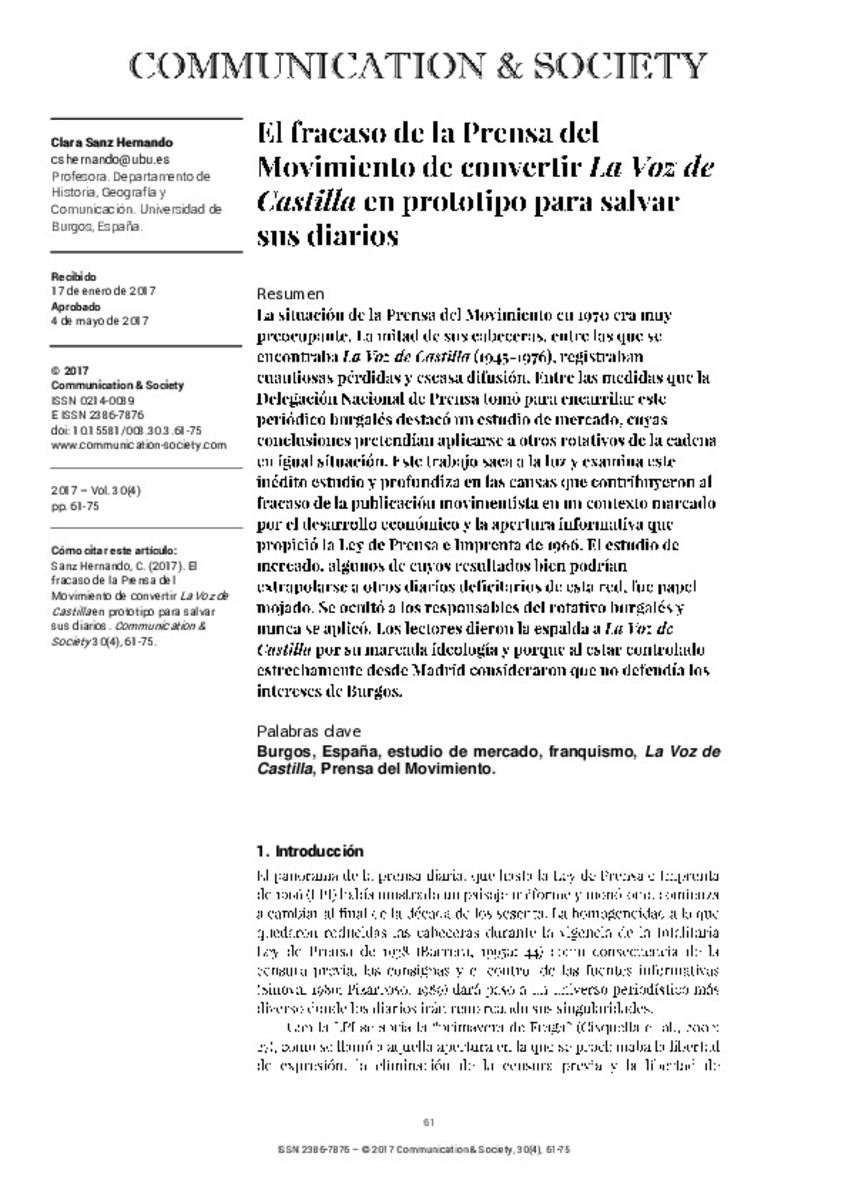Full metadata record
| DC Field | Value | Language |
|---|---|---|
| dc.creator | Sanz-Hernando, C. (Clara) | - |
| dc.date.accessioned | 2018-10-17T10:29:51Z | - |
| dc.date.available | 2018-10-17T10:29:51Z | - |
| dc.date.issued | 2017 | - |
| dc.identifier.citation | Sanz-Hernando, C. (Clara). "El fracaso de la Prensa del Movimiento de convertir La Voz de Castilla en prototipo para salvar sus diarios". Communication & Society. 30 (4), 2017, 61 - 75 | es |
| dc.identifier.issn | 2386-7876 | - |
| dc.identifier.uri | https://hdl.handle.net/10171/54610 | - |
| dc.description.abstract | La situación de la Prensa del Movimiento en 1970 era muy preocupante. La mitad de sus cabeceras, entre las que se encontraba La Voz de Castilla (1945-1976), registraban cuantiosas pérdidas y escasa difusión. Entre las medidas que la Delegación Nacional de Prensa tomó para encarrilar este periódico burgalés destacó un estudio de mercado, cuyas conclusiones pretendían aplicarse a otros rotativos de la cadena en igual situación. Este trabajo saca a la luz y examina este inédito estudio y profundiza en las causas que contribuyeron al fracaso de la publicación movimentista en un contexto marcado por el desarrollo económico y la apertura informativa que propició la Ley de Prensa e Imprenta de 1966. El estudio de mercado, algunos de cuyos resultados bien podrían extrapolarse a otros diarios deficitarios de esta red, fue papel mojado. Se ocultó a los responsables del rotativo burgalés y nunca se aplicó. Los lectores dieron la espalda a La Voz de Castilla por su marcada ideología y porque al estar controlado estrechamente desde Madrid consideraron que no defendía los intereses de Burgos. | es_ES |
| dc.description.abstract | The situation of the Press Group of the Francoist Movement was, by 1970, very worrying. Half of its newspaper titles, among which La Voz de Castilla (1945-1976), were recording substantial losses and low circulation rates. A marketing study stands out among the measures that the National Press Delegation took to relaunch this newspaper, the conclusions of which it intended to apply to other newspapers of the press group facing similar circumstances. This hitherto unknown marketing study is brought to light in this paper through an in-depth study of the causes that contributed to the failure of the Francoist Movement press, in a context marked by economic development and greater press freedom enshrined in the Ley de Prensa e Imprenta [Press Law of 1966]. The marketing study, with some results that could be extrapolated to other failing newspapers of the network, was a damp squib. It was withheld from the management of the Burgos newspaper and never applied. Readers turned their backs on La Voz de Castilla, because of its markedly ideological stance and because it was so closely controlled from Madrid that they considered it was not defending the interests of Burgos. | es_ES |
| dc.language.iso | spa | es_ES |
| dc.publisher | Servicio de Publicaciones de la Universidad de Navarra | es_ES |
| dc.rights | info:eu-repo/semantics/openAccess | es_ES |
| dc.subject | Burgos | es_ES |
| dc.subject | España | es_ES |
| dc.subject | estudio de mercado | es_ES |
| dc.subject | franquismo | es_ES |
| dc.subject | La Voz de Castilla | es_ES |
| dc.subject | Prensa del Movimiento | es_ES |
| dc.title | El fracaso de la Prensa del Movimiento de convertir La Voz de Castilla en prototipo para salvar sus diarios | es_ES |
| dc.title.alternative | The failure of the Francoist Movement Press Group to convert La Voz de Castilla into a prototype to save its newspapers | es_ES |
| dc.type | info:eu-repo/semantics/article | es_ES |
| dc.publisher.place | Pamplona | es_ES |
| dc.identifier.doi | 10.15581/003.30.35759 | es_ES |
| dadun.citation.endingPage | 75 | es_ES |
| dadun.citation.number | 4 | es_ES |
| dadun.citation.publicationName | Communication & Society | es_ES |
| dadun.citation.startingPage | 61 | es_ES |
| dadun.citation.volume | 30 | es_ES |
Files in This Item:
Statistics and impact
Items in Dadun are protected by copyright, with all rights reserved, unless otherwise indicated.






